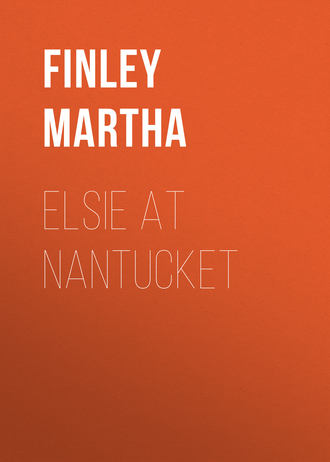 полная версия
полная версияElsie at Nantucket
"No," acknowledged the captain; "but let us watch now and try to make out his secret."
They did watch closely for ten minutes or more, while wave after wave came rushing in and broke along the beach, the fisherman's eyes all the while intent upon them as he stood motionless beside his boat; then suddenly seeming to see the right one – though to the captain and Max it did not look different from many of its neglected predecessors – he gave his dory a vigorous push that sent it out upon the top of that very wave, leaped into the stern, seized his oars, and with a powerful stroke sent the boat out beyond the breakers.
"Bravo!" cried Max, clapping his hands and laughing with delight; "see, papa, how nicely he rides now on the long swells! How I should like to be able to manage a boat like that. May I learn if I have the chance?"
"Yes," said his father; "I should like to have you a proficient in all manly accomplishments, only don't be foolhardy and run useless risks. I want my son to be brave, but not rash; ready to meet danger with coolness and courage when duty calls, and to have the proper training to enable him to do so intelligently, but not to rush recklessly into it to no good end."
"Yes, papa," Max answered; "I mean to try to be just such a man as my father is; but do you mean that I may take lessons in managing a boat on the sea, if I can find somebody to teach me?"
"I do; I shall inquire about among the fishermen and see who is capable and willing for the task. Come, let us go down to the beach; we shall have abundance of time for a stroll before breakfast."
At that moment Lulu joined them with a gay good-morning to each; she was in a happy mood. "Oh, what a lovely morning! what a delightful place this is!" she cried. "Papa, can't we take a walk?"
"Yes, Max and I were about starting for one, and shall be pleased to have your company."
"I'd like to go to Tom Never's Head, papa," said Max.
"Oh, so should I!" cried Lulu.
"I believe they call the distance from here about two miles," remarked the captain reflectively; "but such a walk before breakfast in this bracing air I presume will not damage children as strong and healthy as these two of mine," regarding them with a fond, fatherly smile. "So come along, we will try it."
He took Lulu's hand, and the three wended their way southward along Sunset Heights, greatly enjoying the sight of the ocean, its waves glittering and dancing in the brilliant sunlight, their booming sound as they broke along the beach and the exhilarating breeze blowing fresh and pure from them.
"This is a very dangerous coast," the captain remarked, "especially in winter, when it is visited by fierce gales; a great many vessels have been wrecked on Nantucket coast."
"Yes, papa," said Max; "I heard a story the other day of a ship that was wrecked the night before Christmas, eight or ten years ago, on this shore. Nobody knew that a ship was near until the next morning, when pieces of wreck, floating barrels, and dead bodies were cast up on the beach.
"They found that one man had got to land alive; they knew it because he was quite a distance from the beach, though entirely dead when they found him. You see there was just one farmhouse in sight from the scene of the disaster, and they had alight that night because somebody was sick; and they supposed the man saw the light and tried to reach it, but was too much exhausted by fatigue and the dreadful cold, for it seemed his clothes had all been torn off him by the waves; he was stark naked when found, and lying on the ground, which showed that he had struggled hard to get up after falling down upon it.
"I think they said the ship was called the Isaac Newton, was loaded with barrels of coal-oil, and bound for Holland."
"What a terrible death!" Lulu said with a shudder, and clinging more tightly to her father's hand; "every one drowned and may be half frozen for hours before they died. Oh, papa, I wish you didn't belong to the navy, but lived all the time on land! I am so afraid your ship will be wrecked some time," she ended with a sob.
"It is not only upon the water that people die by what we call accident, daughter," the captain answered; "many horrible deaths occur on land – many to which drowning would in my opinion be far preferable.
"But you must remember that we are under God's care and protection everywhere, on land and on sea; and that if we are His children no real evil can befall us. I am very glad you love me, my child, but I would not have you make yourself unhappy with useless fears on my account. Trust the Lord for me and all whom you love."
They pressed onward and presently came upon a lovely lakelet near the beach, as clear as crystal and with bushes with dark green foliage growing on all sides but that toward the sea.
They stopped for a moment to gaze upon it with surprise and admiration, then pushed on again till the top of the high bluff known as Tom Never's Head was reached.
They stood upon its brink and looked off westward and northward over the heaving, tumbling ocean, as far as the eye could reach to the line where sea and sky seemed to meet, taking in long draughts of the pure, invigorating air, and listening to the roar of the breakers below.
"What is that down there?" asked Lulu.
"Part of a wreck, evidently," answered her father; "it must have been there a long while, it is so deeply imbedded in the sand."
"I wish I knew its story," said Lulu; "I hope everybody wasn't drowned when it was lost."
"It must have happened years ago, before that life-saving station was built," remarked Max.
"Life-saving station," repeated Lulu, turning to look in the direction of his glance; "what's that?"
"Do you not know what that means?" asked her father. "It is high time you did. Those small houses are built here and there all along our coast by the general government, for the purpose of accommodating each a band of surf-men, who are employed by the government to keep a lookout for vessels in distress, and give them all the aid in their power.
"They are provided with lifeboats, buoys, and other necessary things to enable them to do so successfully. If it were not too near breakfast time I should take you over there to see their apparatus; but we must defer it to some other day, which will be quite as well, for then we may bring a larger party with us. Now for home," he added, again taking Lulu's hand; "if your appetites are as keen as mine you will be glad to get there and to the table."
"Two good hours to bathing-time," remarked Mr. Dinsmore, consulting his watch as they rose from the breakfast table. "I propose that we utilize them in a visit to Sankaty lighthouse."
All were well satisfied to do so, and presently they set off, some driving, others walking, for the distance is not great, and even feeble folk often find themselves able to take quite long tramps in the bracing sea air.
Max and Lulu preferred to walk when they learned that their father intended doing so; then Grace, though extremely fond of driving, begged leave to join their party, and the captain finally granted her request, thinking within himself that he could carry her if her strength gave out.
The little face grew radiant with delight.
"Oh, you are a nice, good papa!" she cried, giving him a hug and kiss, for he was seated with her upon his knee.
"I am glad you think so," he said, laughingly, as he returned her caress. "Well, as soon as I have helped your mamma into the carriage we will start."
They set out presently, Grace holding fast to one of his hands while Lulu had the other, and tripping gayly along by his side till, passing out of the village, they struck into the narrow path leading to Sankaty; then the little maid moved along more soberly, looking far away over the rolling billows and watching the progress of some vessels in the offing.
They could hear the dash of the waves on the beach below, but could not see it for the over-hanging cliffs, the path running some yards distant from their brink.
"I want to see where the waves come up," said Lulu; "there's Max looking down over the edge; can't we go and look too, papa?"
"Yes, with me along to take care of you," he said, turning from the path and leading them seaward; "but don't venture alone, the ground might crumble under your feet and you would have a terrible fall, going down many feet right into the sea."
They had reached the brink. Grace, clinging tightly to her father's hand, took one timid peep, then drew back in terror. "Oh, papa, how far down it is!" she exclaimed. "Oh, let's get away, for fear the ground will break and let us fall."
"Pooh! Gracie, don't be such a coward," said Lulu. "I shouldn't be afraid even if papa hadn't hold of our hands."
"I should be afraid for you, Lulu, so venturesome as you are," said the captain, drawing her a little farther back. "Max, my son, be careful."
"Yes, sir, I will. Papa, do you know how high this bluff is?"
"They say the bank is eighty-five feet high where the lighthouse stands, and I presume it is about the same here. Now, children, we will walk on."
Grace's strength held out wonderfully; she insisted she was not at all tired, even when the end of their walk was reached.
The other division of the party had arrived some minutes before, and several were already making the ascent to the top of the lighthouse tower; the rest were scattered, waiting their turn in the neat parlor of the keeper's snug little home, or wandering over the grassy expanse between it and the sea.
"There are Grandma Elsie and mamma in the house," cried Grace, catching sight of them through a window.
"Yes," said her father, "we will go in there and wait our turn with them," leading the way as he spoke. "Do you want to go up into the tower, Gracie?"
"Oh no, no, papa!" she cried, "what would be the use? and I am afraid I might fall."
"What, with your big strong father to hold you fast?" he asked laughingly, sitting down and drawing her to a seat upon his knee; for they had entered the parlor.
"It might tire you to hold me so hard; I'm getting so big now," she answered naïvely, looking up into his face with a loving smile and stealing an arm about his neck.
"Ah, no danger of that," he laughed. "Why, I believe I could hold even your mamma or Lulu, and that against their will, without being greatly exhausted by the exertion.
"My dear," turning to Violet, "shall I have the pleasure of helping you up to the top of the tower?"
"Thank you, I think I shall not try it to-day," she answered; "they tell me the steps are very steep and hard to climb."
"Ah, so I suppose, and I think you are wise not to attempt it."
"But I may, mayn't I, papa?" Lulu said. "You know I always like to go everywhere."
"I fear it will be a hard climb for a girl of your size," he answered doubtfully.
"Oh, but I want to go, and I don't care if it is a hard climb," she said coaxingly, coming close to his side and laying her hand on his shoulder. "Please, papa, do say I may."
"Yes, since you are so desirous," he said, in an indulgent tone.
Max came hurrying in. "We can go up now, papa," he said; "the others have come down."
Edward and Zoe were just behind the boy. "Oh, you ought all to go up," cried the latter; "the view's just splendid."
"Mother," said Edward, "the view is very fine, but there are sixty steps, each a foot high; a pretty hard climb for a lady, I should think. Will you go up? may I have the pleasure of helping you?"
"Yes," she answered; "I am quite strong and well, and think the view will probably pay for the exertion."
They took the lead, the captain following with Lulu, and Max bringing up the rear.
Having reached the top and viewed the great light (one of the finest on the coast) from the interior, Elsie stepped outside, and holding fast to Edward's hand made the entire circuit, enjoying the extended view on all sides.
Stepping in again, she drew a long breath of relief. "I should not like to try that in a strong wind," she said, "or at all if I were easily made dizzy; no, nor in any case without a strong arm to cling to for safety; for there is plenty of space to fall through between the iron railing and the masonry."
"I should tremble to see you try it alone, mother," Edward said.
"It is a trifle dangerous," acknowledged the keeper.
"Yet safe enough for a sailor," laughed the captain, stepping out.
"Oh, papa, let me go too, please do!" pleaded Lulu.
"Why should you care to?" asked her father.
"To see the prospect, papa; oh, do let me! there can't be any danger with you to hold me tight."
For answer he leaned down and helped her up the step, then led her slowly round, giving her time to take in all the beauties of the scene, taking care of Max too, who was slowly following.
"I presume you are a little careful whom you allow to make that round?" the captain observed inquiringly to the keeper when again they stood inside.
"Yes, and we have never had an accident; but I don't know but there was a narrow escape from it the other day.
"Of course crowds of people come here almost every day while summer visitors are on the island, and we can't always judge what kind they are; but we know it is not an uncommon thing for people standing on the brink of a precipice or any height to feel an uncontrollable inclination to throw themselves down it, and therefore we are on the watch.
"Well, the other day I let a strange woman out there, but presently when
I saw her looking down over the edge and heard her mutter to herself,
'Shall I know him when I see him? shall I know him when I see him?' I
pulled her inside in a hurry."
"You thought she was deranged and about to commit suicide by precipitating herself to the ground?" Edward said inquiringly.
"Exactly, sir," returned the keeper.
All of their number who wished to do so having visited the top of the tower, our party prepared to leave.
"Are you going to walk back, papa? Mayn't I go with you?" pleaded Grace.
"No, daughter, we must not try your strength too far," he said, lifting her into the carriage where Grandma Elsie and Violet were already seated. "I am going on a mile further to Sachacha Pond, ladies," he remarked; "will you drive there, or directly home?"
"There, if there is time to go and return before the bathing hour," they answered.
"Quite. I think," he replied, and the carriage moved on, he with Max and Lulu, and several of the young gentlemen of the company following on foot.
Sachacha Pond they found to be a pretty sheet of water only slightly salt, a mile long and three quarters of a mile wide, separated from the ocean by a long narrow strip of sandy beach. No stream enters it, but it is the reservoir of the rainfall from the low-lying hills sloping down to its shores.
Quidnet – a hamlet of perhaps a half dozen houses – stands on its banks.
It is to this pond people go to fish for perch; calling it fresh-water fishing; here too they "bob" for eels.
Our party had not come to fish this time, yet had an errand aside from a desire to see the spot – namely, to make arrangements for going sharking the next day.
Driving and walking on to Quidnet they soon found an old, experienced mariner who possessed a suitable boat and was well pleased to undertake the job of carrying their party out to the sharking grounds on the shoals. He would need a crew of two men, easily to be found among his neighbors, he said; he would also provide the necessary tackle. The bait would be perch, which they would catch here in the pond before setting out for the trip by sea to their destination – about a mile away.
Mr. Dinsmore, his three grandsons, and Bob Johnson were all to be of the party. Max was longing to go too, but hardly thought he would be allowed; he was hesitating whether to make the request when his father, catching his eager, wistful look, suddenly asked, "Would you like to go, Max?"
"Oh, yes, papa, yes, indeed!" was the eager response, and the boy's heart bounded with delight at the answer, in a kindly indulgent tone, "Very well, you may."
Lulu, hearing it, cried out, "Oh, couldn't I go too, papa?"
"You? a little girl?" her father said, turning an astonished look upon her; "absurd! no, of course you can't."
"I think I might," persisted Lulu; "I've heard that ladies go sometimes, and I shouldn't be a bit afraid or get in anybody's way."
"You can't go, so let me hear no more about it," the captain answered decidedly as they turned toward home, the arrangements for the morrow's expedition being completed.
"Wouldn't Lulu like to ride?" Violet asked, speaking from the carriage window; "she has already done a good deal of walking to-day."
The carriage stopped, and the captain picked Lulu up and put her in it without waiting for her to reply, for he saw that she was sulking over his refusal of her request.
She continued silent during the short drive to the cottage, and scarcely spoke while hurriedly dressing for the surf-bath.
The contemplated sharking expedition was the chief topic of conversation at the dinner-table, and it was quite evident that those who were going looked forward to a good deal of sport.
The frown on Lulu's face grew darker as she listened. Why should not she have a share in the fun as well as Max? she was sure she was quite as brave, and not any more likely to be seasick; and papa ought to be as willing to give enjoyment to his daughter as to his son.
She presently slipped away to the beach and sat down alone to brood over it, nursing her ill-humor and missing much enjoyment which she might have had because this – a very doubtful one at the best – was denied her.
Looking round after a while, and seeing her father sitting alone on a bench at some little distance, she went to him and asked, "Why can't I go with you to-morrow, papa? I don't see why I can't as well as Max."
"Max is a boy and you are a girl, which makes a vast difference whether you see it or not," the captain answered. "But I told you to let me hear no more about it. I am astonished at your assurance in approaching me again on the subject."
Lulu was silent for a moment, then said complainingly, "And I suppose
I'll not be allowed to take my bath either?"
"I don't forbid you," the captain said kindly, putting his arm about her and drawing her in between his knees; "provided you promise to keep fast hold of the rope all the time you are in. With that, and Captain Gorham keeping close watch, you will not be in much danger, I think; but I should be much easier in mind – it would give me great satisfaction – if my little girl would voluntarily relinquish the bath for this one day that I shall not be here to take care of her, for possibly she might be swept away, and it would be a terrible thing to me to lose her."
"I 'most wonder you don't say a good thing, papa, I'm so often naughty and troublesome," she said, suddenly becoming humble and penitent.
"No, it would not be true; your naughtiness often pains me deeply, but I must continue to love my own child in spite of it all," he responded, bending down and imprinting a kiss upon her lips.
"And I love you, papa; indeed, indeed I do," she said, with her arm round his neck, her cheek pressed close to his; "and I won't go in to-morrow; I'm glad to promise not to if it will make you feel easier and enjoy your day more."
"Thank you, my dear child," he said. "I have not the least doubt of your affection."
Edward had spread a rug on the sand just high enough on the beach to be out of reach of the incoming waves, and Zoe, with a book in her hand, was half reclining upon it, resting on her elbow and gazing far out over the waters.
"Well, Mrs. Travilla, for once I find you alone. What has become of your other half?" said a lively voice at her side.
"Oh, is it you, Betty?" Zoe exclaimed, quickly turning her head and glancing up at the speaker.
"No one else, I assure you," returned the lively girl, dropping down on the sand and folding her hands in her lap. "Where did you say Ned is?"
"I didn't say; but he has gone to help mamma down with her shawls and so forth."
"He's the best of sons as well as of husbands," remarked Betty; "but I'm glad he's away for a moment just now, as I want a private word with you. Don't you think it is just a trifle mean and selfish for all our gentlemen to be going off on a pleasure excursion without so much as asking if one of us would like to accompany them?"
"I hadn't thought anything about it," replied Zoe.
"Well, think now, if you please; wouldn't you go if you had an invitation? Don't you want to go?"
"Yes, if it's the proper thing; I'd like to go everywhere with my husband. I'll ask him about it. Here he comes, mamma with him."
She waited till the two were comfortably settled by her side, then said, with her most insinuating smile, "I'd like to go sharking, Ned; won't you take me along to-morrow?"
"Why, what an idea, little wife!" he exclaimed in surprise. "I really hate to say no to any request of yours, but I do not think it would be entirely safe for you. We are not going on the comparatively quiet waters of the harbor, but out into the ocean itself, and that in a whaleboat, and we may have very rough sailing; besides, it is not at all impossible that a man-eating shark might get into the boat alive, and, as I heard an old fisherman say yesterday, 'make ugly work.'"
"Then I don't want to go," Zoe said, "and I'd rather you wouldn't; just suppose you should get a bite?"
"Oh, no danger!" laughed Edward; "a man is better able to take care of himself than a woman is of herself."
"Pooh!" exclaimed Betty; "I don't believe any such thing, and I want to go; I want to be able to say I've done and seen everything other summer visitors do and see on this island."
"Only a foolish reason, is it not, Betty?" mildly remonstrated her Cousin Elsie. "But you will have to ask my father's consent, as he is your guardian."
"No use whatever," remarked Bob, who had joined them a moment before; "I know uncle well enough to be able to tell you that beforehand. Aren't you equally sure of the result of such an application, Ned?"
"Yes."
"Besides," pursued Bob, teasingly, "there wouldn't be room in the boat for a fine lady like my sister Betty, with her flounces and furbelows; also you'd likely get awfully sick with the rolling and pitching of the boat, and leaning over the side for the purpose of depositing your breakfast in the sea, tumble in among the sharks and give them one."
"Oh, you horrid fellow!" she exclaimed, half angrily; "I shouldn't do anything of the kind; I should wear no furbelows, be no more likely to an attack of sea-sickness than yourself, and could get out of the way of a shark quite as nimbly as any one else."
"Well, go and ask uncle," he laughed.
Betty made no move to go; she knew as well as he how Mr. Dinsmore would treat such a request.
The weather the next morning was all that could be desired for sharking, and the gentlemen set off in due time, all in fine spirits.
They were absent all day, returning early in the evening quite elated with their success.
Max had a wonderful tale to tell Lulu and Grace of "papa's" skill, the number of sand-sharks and the tremendous "blue dog" or man-eater he had taken. The captain was not half so proud of his success as was his admiring son.
"I thought all the sharks were man-eaters," said Lulu.
"No, the sand-sharks are not."
"Did everybody catch a man-eater?"
"No; nobody but papa took a full-grown one. Grandpa Dinsmore and Uncle Edward each caught a baby one, and all of them took big fellows of the other kind. I suppose they are the most common, and it's a good thing, because of course they are not nearly so dangerous."
"How many did you catch, Maxie?" asked Grace.
"I? Oh, I helped catch the perch for bait; but I didn't try for sharks, for of course a boy wouldn't be strong enough to haul such big fellows in. I tell you the men had a hard tug, especially with the blue-dog.
"The sand-sharks they killed when they'd got 'em close up to the gunwale by pounding them on the nose with a club – a good many hard whacks it took, too; but the blue-dog had to be stabbed with a lance; and I should think it took considerable courage and skill to do it, with such a big, strong, wicked-looking fellow. You just ought to have seen how he rolled over and over in the water and lashed it into a foam with his tail, how angry his eyes looked, and how he showed his sharp white teeth. I thought once he'd be right in among us the next minute, but he didn't; they got the lance down his throat just in time to put a stop to that."









